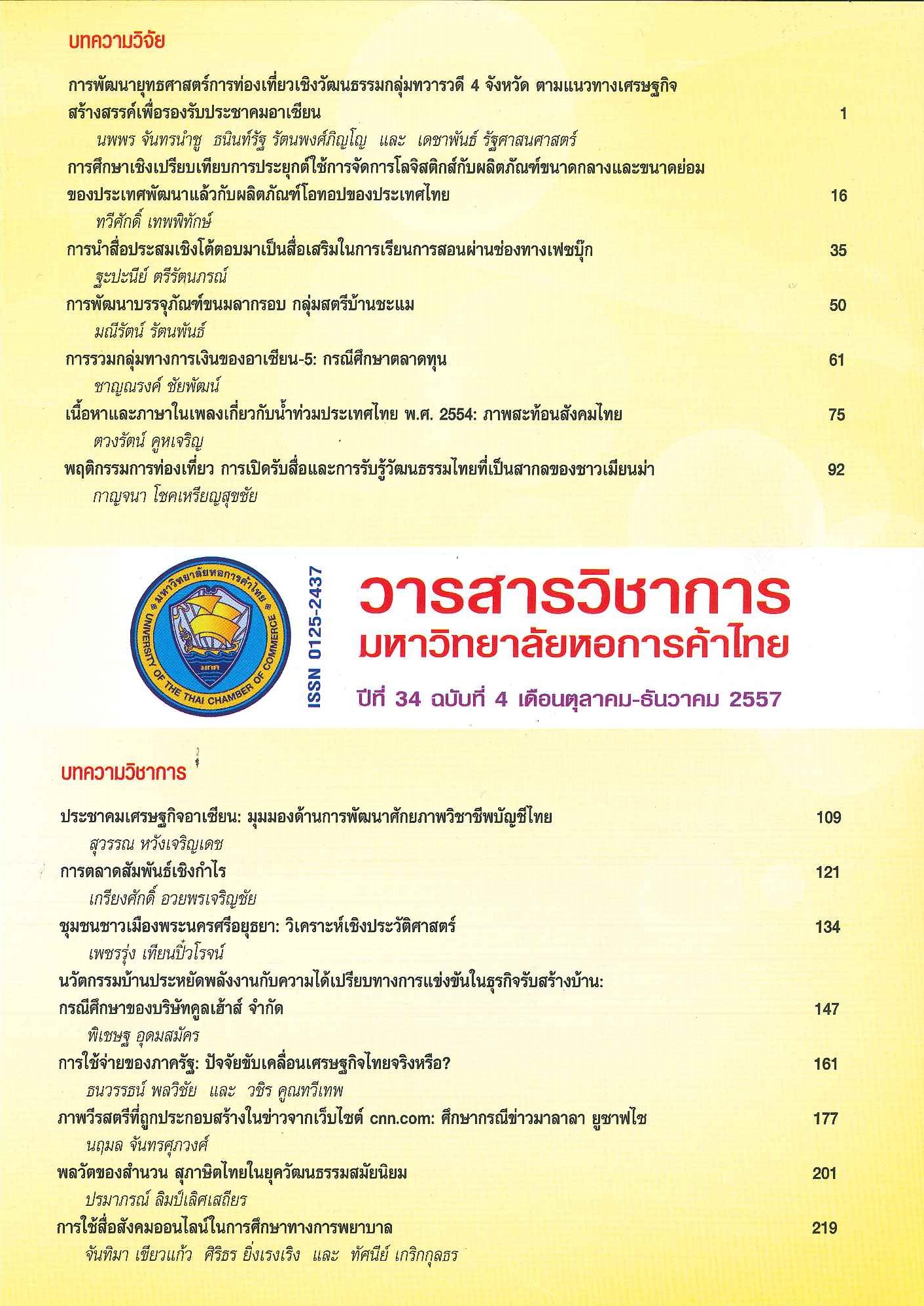Uses of Online Social Media in Nursing Education
Main Article Content
Abstract
Using information technology is the required core competency according to Thailand’s qualification framework for undergraduate nurse. Nurses need to obtain computer literacy, information literacy, and informatics skills in order to practice within the environment of a technological society after graduation. Nowadays, electronic communications through social media is a medium to reach people at all levels. Expansion of communication through social media promotes involvement between patients and nurses. Although the use of social media in nursing education is still a novelty, a literature review provides suggestions on using social media as part of promoting the learning performance and management of nursing education. This article presents an example of using social media for consideration in order to choose the right social media for nursing education.
Article Details

This work is licensed under a Creative Commons Attribution-NonCommercial-NoDerivatives 4.0 International License.
ลิขสิทธิ์ของบทความ
ผลงานที่ได้รับการตีพิมพ์ถือเป็นลิขสิทธิ์ของมหาวิทยาลัยหอการค้าไทย ห้ามมิให้นำเนื้อหา ทัศนะ หรือข้อคิดเห็นใด ๆ ของผลงานไปทำซ้ำ ดัดแปลง หรือเผยแพร่ ไม่ว่าทั้งหมดหรือบางส่วนโดยไม่ได้รับอนุญาตเป็นลายลักษณ์อักษรจากมหาวิทยาลัยหอการค้าไทยก่อน
References
American Nurses Association. 2011. Social Networking Principles Toolkit [Online]. Available: www.nursingworld.org/socialnetworkingtoolkit
Amerson, R. 2011. “Facebook: A Tool for Nursing Education Research.” Journal of Nursing Education 50, 7: 414-416.
Barry, J., and Hardiker, N. 2012. “Advancing Nursing Practice through Social Media: A Global Perspective.” The Online Journal of Issues in Nursing 17,3: Manuscript 5.
Betton, V., and Tomlinson, V. 2013. Social Media in Mental Health Practice: Online Tools for Recovery and Living Well. West Yorkshire: Leeds and York Partnership Foundation Trust.
Billings, D. M. 2009. “Wikis and Blogs: Consider the Possibilities for Continuing Nursing Education.” Journal of Continuing Education in Nursing 40, 12: 534–535. doi:10.3928/00220124–20091119-10
Boonsonti, Nattawut, et al. 2013. Need for IT Services of Nursing Students of Boromarajonani College of Nursing Saraburi: Proceedings of the 1st National Conference Co-hosted by the Faculty of Management Science, Silpakorn University and UTCC Asian Media Studies and Research Center, March 22, 2013. Petchburi: Silpakorn University. (in Thai).
ณัฐวุฒิ บุญสนธิ และคณะ. 2556. ความต้องการใช้บริการงานเทคโนโลยีสารสนเทศของนักศึกษาวิทยาลัยพยาบาลบรมราชชนนีสระบุรี: เอกสารสืบเนื่องประชุมวิชาการระดับชาติ คณะวิทยาการจัดการ มหาวิทยาลัยศิลปากร ร่วมกับ ศูนย์ศึกษาสื่อและการสื่อสารอาเซียน มหาวิทยาลัยหอการค้าไทย ครั้งที่ 1 วันที่ 22 มีนาคม 2556. เพชรบุรี: มหาวิทยาลัยศิลปากร.
Burdick, Kristi M. 2012. “Noelle Marie Upton: Using Social Media to Enhance Nursing Education.” Journal of Nursing Education 51, 7: 416. doi: 10.3928/01484834-20120620-02
College of Nurses of Ontario. 2011. “Nursing 2.0.” The Standard 36, 3: 10–13. Available: www.cno.org/Global/pubs/mag/TSMvol36no3ENG.pdf
College of Registered Nurses of British Columbia. 2012. Professionalism, Nurses and Social Media [Online]. Available:www.crnbc.ca/Standards/Confidentiality/Pages/SocialMedia.aspx
Dahlstrom, E., et al. 2011. National Study of Students and Information Technology in Higher Education [Online]. Available: www.educause.edu/2011StudentStudy
Dujsik, D., and Cai, S. 2011. “Incorporating Weblogs into ESL Writing Classes.” University of the Thai Chamber of Commerce Journal 31, 3: 103-118.
Evan, Mike. 2006. The Evolution of Web – from Web 1.0 –to Web 4.0 [Online]. Available: http://www.cscan.org/presentations/08-11-06-MikeEvans-Web.pdf
Forbes, M. O., and Hickey, M. T. 2010. “Podcasting: Implementation and Evaluation in an Undergraduate Nursing Program.” Nurse Educator 33, 5: 224-227. doi:10.1097/01.NNE.0000334775.98018.e8
Fraser, R. 2011. The Nurse’s Social Media Advantage: How Making Connections and Sharing Ideas Can Enhance Your Nursing Practice. Indianapolis: Sigma Theta Tau International.
Grassley, J. S., and Bartoletti, R. 2009. “Wikis and Blogs: Tools for Online Interaction.” Nurse Educator 34, 5: 209–213. doi:10.1097/NNE.0b013e3181b2b59b
Haigh, C. 2010. “Legality, the Web and Nurse Educators.” Nurse Education Today 30,6: 553-556. doi:10.1016/j.nedt.2009.11.008
Kaplan, A.M., and Haenlein, M. 2010. “Users of the World, Unite! The challenges and Ppportunities of Social Media.” Business Horizons 53,1: 59–68.
Lachman, Vicki D. 2013. “Social Media: Managing the Ethical Issues.” MEDSURG Nursing 22, 5: 326-329.
Mayfield, Anthony. 2008. What is Social Media? [Online]. Available: http://www.icrossing.co.uk/fileadmin/uploads/eBooks/What_is_Social_Media_iCrossing_ebook.pdf). ICrossing
Mistry, V. 2011. “Critical Care Training: Using Twitter as a Teaching Tool.” British Journal of Nursing 20, 20: 1292–1296.
National Education Act, B.E. 2542 [Online]. 2011. Available: http://www.moe.go.th/main2/plan/p-r-b42-01.htm (in Thai).
พระราชบัญญัติการศึกษาแห่งชาติ พ.ศ. 2542 [ออนไลน์]. 2554. เข้าถึงจาก: http://www.moe.go.th/main2/plan/p-r-b42-01.htm
“Nursing Network Development Plan for Health Promotion Phase 2 (2551-2553).” 2011. Newsletter Nurses of Thai Health Promotion Foundation on Strategy 2 Building Nurses’ Competencies on Health Promotion 2:4. Available: http://home.kku.ac.th/hpnn/files/Newsletter_Iss.02.pdf (in Thai).
“แผนงานพัฒนาเครือข่ายพยาบาลศาสตร์เพื่อการสร้างเสริมสุขภาพระยะที่ 2 (2551-2553).” 2533. จดหมายข่าว พย.สสส. ตามยุทธศาสตร์ที่ 2 การสร้างสมรรถนะพยาบาลสร้างเสริมสุขภาพ 2: 4. เข้าถึงจาก: http://home.kku.ac.th/hpnn/files/Newsletter_Iss.02.pdf
Ressler, P., and Glazer, G. 2010. “Nursing’s Engagement in Health Policy and Healthcare Through Social Media.” Nevada RNformation 20: 1, 18.
Roland, E.J., Johnson, C., and Swain, Deborah. 2011. “Blogging” as an Educational Enhancement Tool for Improved Student Performance: A Pilot Study in Undergraduate Nursing Education.” New Review of Information Networking 16: 151–166.
Romiszowski, A. J. 1992. Computer Mediated Communication: A Selected Bibliography. Englewood Cliffs, NJ: Educational Technology Publications.
Safko, Lon, and Brake, David K. 2009. The Social Media Bible: Tactics, Tools, and Strategies for Business Success. New York: Wiley.
Schmidt, B., and Stewart, S. 2010. “Implementing the Virtual World of Second Life Into Community Nursing Theory and Clinical Courses.” Nurse Educator 35, 2: 74–78. doi:10.1097/NNE.0b013e3181ced999
Schmitt, T.L., Sims-Giddens, S.S., and Booth, R.G. 2012. “Social Media Use in Nursing Education.” Online Journal Issues Nursing 17: 3.
Skiba, D. J. 2011. “Nursing Education 2.0: The Need for Social Media Policies for Schools of Nursing.” Nursing Education Perspectives 32, 2: 126-127. doi:10.5480/1536-5026-32.2.126
Social Media and the Nursing Profession: A Guide to Online Professionalism for Nurses and Nursing Students [Online]. 2012. Available: http://www.cdhb.govt.nz/News/Media-Guide/PublishingImages/Pages/default/Social%20media%20and%20the%20nursing%20profession.pdf
United States. National League for Nursing. Informatics Education Toolkit [Online]. Available: www.nln.org/facultyprograms/facultyresources/index.htm
Weber, Larry. 2009. Marketing to the Social Web: How Digital Customer Communities Build Your Business. 2nd ed. New York: Wiley.


